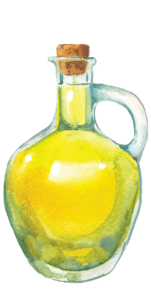 Fats are a type of essential nutrient. The fats you consume provide your body with essential fatty acids called linolenic acid. They are called “essential” because your body cannot make them itself or function without them. Your body needs fats for a number of different reasons, including brain development, controlling inflammation, and blood clotting.1-3 Dietary fats also supply your body with energy and support cell growth.
Fats are a type of essential nutrient. The fats you consume provide your body with essential fatty acids called linolenic acid. They are called “essential” because your body cannot make them itself or function without them. Your body needs fats for a number of different reasons, including brain development, controlling inflammation, and blood clotting.1-3 Dietary fats also supply your body with energy and support cell growth.
There are four major types of fats—saturated, trans, monounsaturated, and polyunsaturated—each of which have different chemical structures and physical properties. The “bad” fats, saturated and trans, are typically solid or semi-solid at room temperature, while the “healthy” fats, mono- and polyunsaturated, typically are liquid at room temperature.2 According to the American Heart Association, the majority of the fats that you eat should be mono- or polyunsaturated.
Saturated Fats—Saturated fat molecules do not have double bonds between the carbon molecules because they are saturated with hydrogen molecules.3 Eating foods high in this type of fat, such as butter, raises the level of LDL (bad) cholesterol in your blood, increasing your risk of heart disease and fatal cardiovascular events. The American Heart Association recommends limiting saturated fats in your diet.
Trans fats—Trans fats are created when vegetable oil undergoes a process called hydrogenation.1 This process can occur naturally or can be artificially manufactured. Like saturated fats, they raise your risk of serious heart disease. The American Heart Association recommends that adults who would benefit from lowering LDL cholesterol reduce their intake of trans fat (or avoid it altogether) and limit their consumption of saturated fat to 5 to 6 percent of total calories.4,5
Monounsaturated Fats—Monounsaturated fats, such as those found in peanut oil, are fat molecules that have one unsaturated carbon bond.6 Oils that contain monounsaturated fats are usually liquid at room temperature but start to turn solid when chilled. This type of fat can have a positive effect on your health when eaten in moderation; it can help reduce bad cholesterol levels in your blood, lowering your risk of heart disease. They also provide nutrients to help develop and support your body’s cells.1,6
Polyunsaturated Fats—Polyunsaturated fats, such as those found in sunflower oil, are fat molecules that have more than one unsaturated carbon bond.1,7 Like monosaturated fats, oils that contain polyunsaturated fats are typically liquid at room temperature but start to turn solid when chilled. These fats can also have a beneficial effect on your health when eaten in moderation, especially when used in place of saturated and trans fats in your diet.7 Like monounsaturated fats, polyunsaturated fats provide essential fatty acids your body needs but can’t produce itself.
Sources
- U.S. National Library of Medicine – Medline Plus website. Dietary fats explained. 12 Jul 2018. https://medlineplus.gov/ency/patientinstructions/000104.htm. Accessed 12 Jan 2021.
- American Heart Association website. Dietary fats. https://www.heart.org/en/healthy-living/healthy-eating/eat-smart/fats/dietary-fats. Accessed 12 Jan 2021.
- American Heart Association website. The facts on fats infographic. https://www.heart.org/en/healthy-living/healthy-eating/eat-smart/fats/the-facts-on-fats. Updated May 2017. Accessed 6 Jan 2021.
- American Heart Association website. Saturated fat. https://www.heart.org/en/healthy-living/healthy-eating/eat-smart/fats/saturated-fats. Accessed 12 Jan 2021.
- American Heart Association website. Trans fat. https://www.heart.org/en/healthy-living/healthy-eating/eat-smart/fats/trans-fat. Accessed 12 Jan 2021.
- American Heart Association website. Monounsaturated fat. https://www.heart.org/en/healthy-living/healthy-eating/eat-smart/fats/monounsaturated-fats. Accessed 12 Jan 2021.
- American Heart Association website. Polyunsaturated fat. 1 Jun 2015. https://www.heart.org/en/healthy-living/healthy-eating/eat-smart/fats/polyunsaturated-fats. Accessed 12 Jan 2021.





